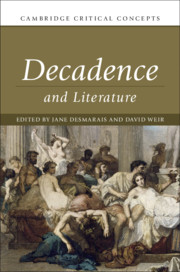Book contents
- Decadence and Literature
- Cambridge Critical Concepts
- Decadence and Literature
- Copyright page
- Dedication
- Contents
- Figures
- Contributors
- Acknowledgements
- Introduction
- Part I Origins
- Part II Developments
- Part III Applications
- Chapter 16 Decadence and Urban Geography
- Chapter 17 Socio-aesthetic Histories: Vienna 1900 and Weimar Berlin
- Chapter 18 Decadence and Cinema
- Chapter 19 Transnational Decadence
- Chapter 20 Decadence and Modernism
- Chapter 21 Modern Prophetic Poetry and the Decadence of Empires: From Kipling to Auden
- Chapter 22 The Gender of Decadence: Paris-Lesbos from the Fin de Siècle to the Interwar Era
- Chapter 23 Decadence and Popular Culture
- Select Bibliography
- Index
- References
Chapter 21 - Modern Prophetic Poetry and the Decadence of Empires: From Kipling to Auden
from Part III - Applications
Published online by Cambridge University Press: 12 August 2019
- Decadence and Literature
- Cambridge Critical Concepts
- Decadence and Literature
- Copyright page
- Dedication
- Contents
- Figures
- Contributors
- Acknowledgements
- Introduction
- Part I Origins
- Part II Developments
- Part III Applications
- Chapter 16 Decadence and Urban Geography
- Chapter 17 Socio-aesthetic Histories: Vienna 1900 and Weimar Berlin
- Chapter 18 Decadence and Cinema
- Chapter 19 Transnational Decadence
- Chapter 20 Decadence and Modernism
- Chapter 21 Modern Prophetic Poetry and the Decadence of Empires: From Kipling to Auden
- Chapter 22 The Gender of Decadence: Paris-Lesbos from the Fin de Siècle to the Interwar Era
- Chapter 23 Decadence and Popular Culture
- Select Bibliography
- Index
- References
Summary
This chapter focuses on decadence not as a supposed literary revolution culminating in modernism but as a continuity in the adoption of poetic subject-matter of a particular kind, namely, the fates of empires and civilisations, especially their fragility, decline, and disintegration. In works of such non-modernist poets as Rudyard Kipling and W. H. Auden the decadent tradition persists under new twentieth-century conditions, not by echoing Baudelairean moods or manners but by rediscovering and reworking the underlying historical myth of the Decadence—the decline and fall of the Roman Empire, considered explicitly or implicitly as the model for the fates of all later empires. In the half-century considered here, 1897–1947, world events pressed collapsing empires to the attention of writers on an unprecedented scale. At such an epoch Kipling, Auden, and others came forward with boldly ‘prophetic’ visions of a world order that they suggest, by reading the symptoms and auguries of the times, is undergoing general collapse.
- Type
- Chapter
- Information
- Decadence and Literature , pp. 347 - 361Publisher: Cambridge University PressPrint publication year: 2019



